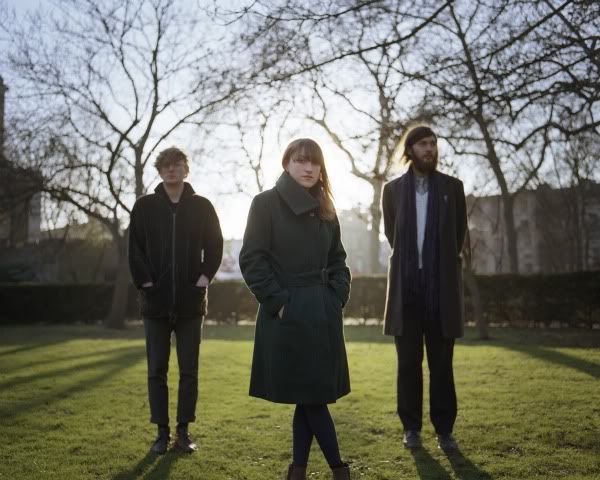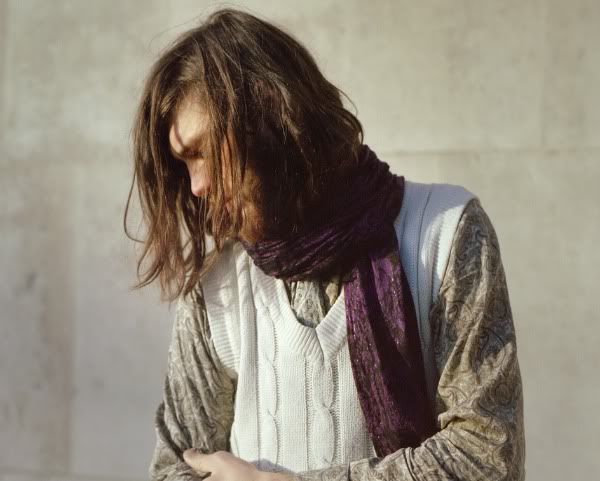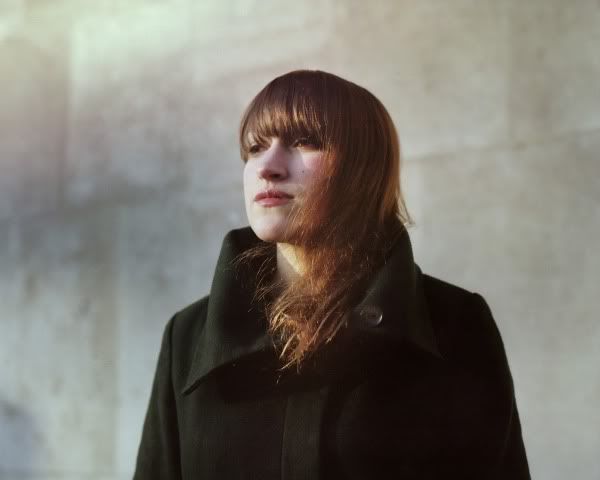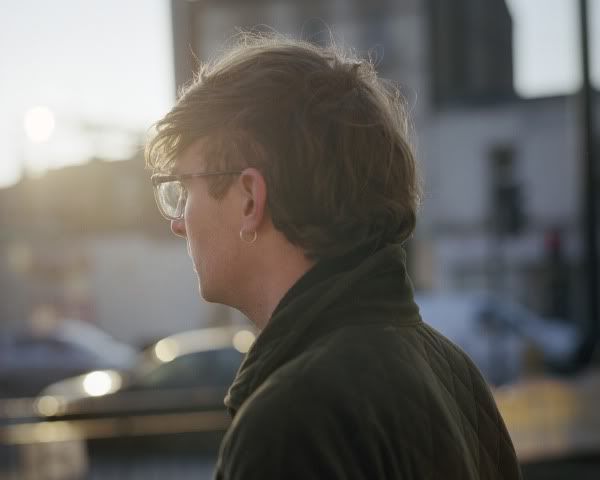Esben and the Witch interview: 'We have our stamp'.
It’s late morning, a few days before Esben And The Witch are set to release their debut album, and I’m standing outside Bethnal Green tube station, smoking and feeling guilty about it, waiting for the trio to appear. I’ve got ‘Violet Cries’, the aforementioned debut album, playing on headphones. The effect is, even when standing on a noisy East London corner, transportive.
It’s a black hole of a record. From the gradual swell of opener Argyria to the grey shimmer and fade of final track Swans, it pulls you in and under. There’s a bristling, enticing tension in the way Marching Song gathers itself and explodes. The soft, sugar-coated nightmare quality of Light Streams lulls. The aching guitar on Warpath is disconcertingly piercing and beautiful in one. This is a band with a knack for drama. A keen understanding of noise, melody, and how use it with both restraint and overload, for maximum, siren-call, pull.
The band got going when guitars and electronics manipulators Thomas Fisher and Daniel Copeman met up when Daniel moved to Brighton. They started messing around with ideas, and eventually decided they ought to try and take things further. “We realized we might like some vocals on it at some point” says Daniel, “after trying briefly myself with less than successful ends, Thomas and Rachel ran into each other”. The three bonded over a mutual appreciation of bands such as Portishead, I Like Trains, Mogwai, and Godspeed You! Black Emperor, as well as literature and film – important influences on Esben And The Witch’s striking, dark, visual aesthetic and song content. Rachel thus far had no experience of singing live, “the first show we ever did was the first time I sang live to more than two people in a bedroom”, but something clearly clicked. After putting out their debut EP ‘33’ themselves, they were signed to Matador and allowed free reign to self-produce their striking debut album. We caught up in between tours, over a few pints in a pub around the corner from the station, where they talked enthusiastically about the recording of their album, the landscapes of Brighton, the influence of history, and their gothic aesthetic.
So you self-released your first EP.
Thomas: That’s kind of a grandiose term for it…
You put it out?
Rachel (laughs): Yeah! We kind of made it in my bedroom.
Daniel: It’s one of those bizarre things with the internet that you can do. Just because things are so instantly accessible with things like bandcamp and all that. You can put something on the internet, and then suddenly it’s ‘self-released’, but as Thomas said that feels quite grandiose for the extent that we…
Thomas: Yeah. The ‘self’ part is right. The ‘released’ part is, well. (laughs)
So it wasn’t a conscious thing of you didn’t want to do it through a label or anything like that. I mean you have smaller labels who tend to become associated with a certain ‘sound’. And you seem to have bypassed that. Was that a thought you had?
Thomas: No not really. We had a song on a Dance To The Radio compilation and that was the only fraternizing we did with other labels before Matador. I mean, I’m not saying we were turning down anything that came along, we just meant to release things at our own time, at our own pace at that stage. Making it ourselves, putting it out ourselves afforded us to figure out…
Daniel: I mean we were really lucky the faith that Matador put in us, and how early they committed to us in that sense, in that we never had any sort of opportunity to do it with anyone else. They’re not the sort of people that you particularly turn down! They ask you if you want to release records and you go, well, yes.
I read somewhere that you said your main influences outside of music were literature, history and geography. I suppose literature with the band name is quite clear, the dark undertone of fairy tales…
Thomas: I think the reason we cite things like that as our influences is because its harder to pin down your musical influences to a couple of artists who you like. I think it’s more complex than that because you’re shaped by all kinds of things that you listen to. Sometimes you might not necessarily like the entire thing but there’s parts that you find inspiring within it. Whereas, the things we find in like literature and art just seem sort of interesting.
Daniel: Sort of mood based…
Thomas: Yeah. It inspires us to start writing in the first place. And that forms a more direct influence. That those things can be what the song is actually about. That’s why we say that.
So when you’re writing, it’s more about the mood that a book or something has evoked than about what mood you happen to be that day?
Thomas: It can be both, I suppose.
Daniel: The entwining of all of those things is what we’re really interested in. How a piece of art, or a book, or just a single rhyming couplet…
Rachel: It’s the starting point really. And then you stumble on other things. And then when those songs are formed, I think the three of us actually take kind of individual viewpoints to the songs ourselves.
Daniel: There isn’t one underlying emotion in each of the songs. It’s kind of a hybrid of a lot of things. They kind of come from different places as well. Sometimes it will often be that one of us will have like a part of song, like a riff or a drum beat that we’ll start from. But then it’s like a case of listening to that and deciding what that makes you think of and then go from there and finding references that also relate to that. You end up with, songs end up more like a spectrum…
Rachel: A patchwork really.
Daniel: Yeah.
In terms of history, I feel like your music isn’t all about the here and now. That it spans back…
Thomas: Yeah, timelessness. We’re trying to distance kind of, make it so it isn’t attached to this time or any other. We don’t want it to be backwards looking or just for 2011 or 2010 or whatever. Yeah.
Daniel: It’s the hallmark of anything great. You can aim for it, and we certainly do aim to try and make it classic and timeless, all the best albums are like that. You can’t decide if you’ve done that, but you have to aim for that.
Rachel: I think as well like a lot of things we are interested in and intrigued by, they come to play a part in the songs tend to be things that happened a long time ago. More historical rather than current. So…
Daniel: There’s stuff that we’re looking at at the moment is more looking forward, but at that time…
Rachel: Exactly. At the time of writing the album…
Daniel: Whatever captures us or intrigues us at the time really. We don’t set out with too much of a… Certainly the album is more referential to the past.
Thomas: With the songs maybe it’s more accidental. But it’s certainly a conscious decision with the artwork and everything we try and surround the songs with, and I think that’s quite a strong way of making something feel timeless, by the way you sort of present it. And that’s something we try and work hard on.
So the visual side of things is very important to you?
Daniel: Really important.
What kind of things influence that?
Daniel: Again, we try to create an atmosphere. It’s not too singular in that we haven’t thought to ourselves we want to have a very distinct kind of, I don’t know, Modernist aesthetic to what we do. Or a very Victorian aesthetic. It’s very much a case of just…
Thomas: … what fits songs, what fits with the album, what we felt kind of summed up the tracks that it contained. Just I suppose, the songs were a starting point and then you just think where to…
Daniel: To try and find images that are suitably evocative or complimentary without being too specific as well.
Rachel: It kind of acts as a signpost to what we’re doing here, or…
Thomas: Yeah. We’re interested in not giving away or not discussing necessarily what our original inspiration might be behind songs, and using the artwork, song-titles and lyrics as kind of clues to what that inspiration might be. In fact with the album we designed an image to go with every song so that if people do wish to look into what our inspiration was for songs around the time that we wrote them, then that’s kind of a way people might be able to do it.
Daniel: That’s what we hoped. That opportunity is there if people want it.
I know the word ‘goth’ has been brought up quite a bit recently in relation to what you do. I mean, in what sense do you think you are a ‘goth’ band, or not?
Rachel: I think um, yeah it’s funny it has been mentioned a lot. But I think the key to it is the difference between ‘Goth’ and ‘Gothic’ and um, being affiliated with the Gothic side of things is, you know, something we are quite happy to be involved with. Not that we would put ourselves into that category, but there’s definitely a link between our music and that architecture and literature. We’re always going to be given a certain…
I suppose you’re always going to be called something.
Rachel: Yeah, so comparatively…
Daniel: It’s ok. I read a great quote the other day about goth music, and it said that the difference between a good goth band and a bad goth band was that any bad that call themselves goth are usually rubbish.
Thomas: So we’re going to try and qualify ourselves as a good band!
So more of a gothic aesthetic?
Daniel: The music is itself has certainly never been intended to be goth, and I don’t really see it in a particularly gothic way at all. But people can take from it what they desire.
Thomas: We’re not adverse to it. But it does feel slightly unusual with it coming up so much, like we’re at the fore of this new ‘scene’ or whatever, which we don’t really feel comfortable with, and we don’t really feel apart of anything like that, and those weren’t our intentions certainly when we were writing the music.
How about geography? How does that play in?
Thomas: Well that’s inspirational in a… less direct way.
Rachel: Landscapes.
Thomas: I mean we were all living in Brighton, spending time on the Downs and on the seafront and it’s more in a way of being in those places and spending time together in those places inspires us to write, and it inspires us to get a sense of atmosphere from places. And that’s really kind of not necessarily directly linked to music, but about sort of, massive expansive spaces and how that makes you feel and then trying to use instrumentation to recreate that feeling. Using synths and guitars and vocal loops to try and recreate that tension. But I mean I think a lot of that comes from the album, we practiced and spent a lot of time writing the album in this really small dark room on the seafront in Brighton. And then whenever we came out of that space it was just desolate seafront. The contrast between those two, it mirrored what we were doing musically at the time. Interested in shifting dynamics quite quickly in our songs, and I think that’s how we felt it’s influence.
Yeah because it is quite a dark sound, but it’s not dark in that kind of industrial, inner city way. It seems more organic.
Thomas: Yeah. I think so.
Daniel: Landscapes really. So geographically it’s this idea of like trying to depict noises that are…
Thomas: We’re thinking of soundtracking landscapes. That’s important.
Daniel: Yeah. Everyone always walks around with headphones on, and you’re always going to think, I mean if I go for a walk on the Downs or along the beach…
Rachel: Or a train journey…
Daniel: … you need a sound track to those things. So I suppose in a way, that was what we were trying to achieve. Make tracks for landscapes.
So if you recorded somewhere completely different, like the middle of a city or in another country, do you think it would dramatically change what you sound like?
Rachel: Umm… I think it would definitely effect. It would be impossible for it not to.
Daniel: Even just driving around America, I think those landscapes have already began to introduce themselves into some of the ideas we’ve been playing around with at the moment. Songs are definitely inspired by sort of like, sprawling desert and stuff like that. Completely foreign landscapes for us. As Rachel was saying, it’s impossible to not be inspired by it.
Rachel: Yeah, I think whether consciously or subconsciously, it is going to effect how we play.
Putting together a song: would you be able to sum up how it works for you guys?
Rachel: Hmm. It’s quite difficult because it’s not something we have a set template for at all. It can start with anything really, be it a guitar riff that someone brings to the table, or a lyric idea even if it’s just a sentence. It could be constructed ourselves, or from a film we’ve watched or explores certain ideas connected to a book we’ve read, certain things we’ll just discuss and be like oh, that could work. And then sometimes that will be it, and then other times we’ll be like hang on, this goes with this, and it just kind of… and that’s when it’s really enjoyable. When it suddenly starts to corral in together.
Thomas: Some are easier than others.
Daniel: Yeah!
Thomas: But sometimes the ones that take the longest, like Daniel has described it as a struggle before a song sort of forms. That’s true, but it can be quite rewarding when that’s the case. When we’ve spent a year or something on a song and then it finally…
Daniel: For me they’re usually the ones that I, possibly because of the struggle, I usually enjoy those the most. The ones that come easily, usually I’m less keen on. I feel, just kind of like…
Thomas: Cheated?
Daniel: Yeah. Because it feels a little bit like it’s too easy. And the ones that we’ve really had to work at, the sense of reward at the end of it is…
Rachel: There’s a moment isn’t there when it clicks. And you’ll find a way in.
Would you say with your new album that the way you make music has changed? In terms of equipment you use, how you work…
Thomas: Yeah, equipment. Equipment has definitely changed. It’s undeniable. We’ve got things now that we didn’t have before. Which is very exciting, it gives us a chance to try different things. We’re all kind of quite new to the instruments we began with anyway, so we’re kind of trying our hands at different things and, as Rachel says, hopefully becoming more accomplished. But the way we approach songwriting I don’t think has really changed…
Daniel: Or recording. Something we were really really lucky with Matador and with the album was that we were able to produce it ourselves and record it ourselves as we had done previously. I mean, the way that we work has never been any different… The idea of going into a studio and having set time lines of how long you’re in there for and knowing that all the time you’re spending in there you’re tossing money, I don’t think that sort of pressure would work for us, in the same way that trying to write songs with a particular remit. As Rachel was saying, it has to be organic and natural I think for it to come out the way it has done. It can mean that it takes a little longer, and it can mean that it’s a struggle, but it certainly pays off.
You produced the album yourselves. Was it very important to you that the album was purely your work?
Rachel: I would certainly say that. We’re quite protective.
Thomas: We don’t really like giving up our control to any party. It was mixed by someone else and that alone was kind of stressful. Yeah, I mean there’s two things. One is just a time issue. Daniel is prepared to spend all the time that’s necessary on it, whereas that might not be the case with someone who comes into it. So we know, we’re pretty aware of what we’re trying to create with that. Daniel is adept enough at production to be able to achieve those effects so it didn’t make any sense for us to give it away.
Rachel: The three of us, we trust each other with everything basically. So it’s nice to work within the band. Just the three of us basically.
Thomas: And there’s a worrying idea that more experienced producers than we would be have such an individual stamp of their own and a desire to effect how something sounds. And that’s not something we want to have involved in the record at this stage. I mean that might not be the case in the future as things change, but at the moment we feel quite strongly that we don’t really…
Daniel: We have our stamp. If we were ever to produce someone else’s album, I’m sure we would put our stamp on that. That is what a producer does invariably, and we didn’t feel like that was necessary because we weren’t creating like demos. We felt that ‘33’ was a produced piece of work. So we didn’t real need someone else to come in and put their own style on top of that.
Rachel: It’s difficult letting it go sometimes!
Did you feel any pressure from anywhere while making the album?
Thomas: No. We were quite lucky just to be able to do it at our own pace.
Daniel: We were given more time than we needed in the end probably. We were just like we need to be told this is done, or we’ll never stop working at it! But yes, it was really really lucky.
Thomas: I remember meeting Daniel one day and he was frantically pacing around his kitchen saying I need a deadline!
So the opposite problem really!
Daniel: Yeah! I couldn’t stop like listening to it. And it just sounded like noise, because I’d heard it so many times it didn’t sound like songs any more.
Rachel: Like when you say a word over and over again it comes out… we were just playing it over and over again and I was like I can’t tell the difference any more. I was just like I don’t know! I’m going mad!
Do you find it difficult to listen back to it now?
Daniel: I haven’t listened to it in a long time actually.
Thomas: Because we listened to it so much!
Rachel: Yeah I found it difficult towards the end of recording just because we’d grown so attached to them. We still are, but when you’re just in the songs all the time it kind of becomes difficult to step away…
Thomas: And to remember what you were aiming for in the first place.
Rachel: Yeah. So it would be nice to go back to it. Sit down and listen to it again.
Daniel: I only really listen to it for references when we’re trying to work out how to play the songs. I go back and I listen to things and I think what was it that I did in the studio to that to make it sound as it did… I don’t know. I haven’t listened to it for enjoyment since we finished it.
So you must be playing live a lot around the album release. Is that something you enjoy?
Daniel: Yeah. It’s really good live.
Thomas: It requires a certain amount of re-organizing the songs. Partly because we produce it ourselves and you can spend a lot of time in the studio going, well that needs another part there. But live, we create everything live so there’s certain things we’re never going to do because we’re limited. So they can kind of take on a different quality.
Rachel: We embrace that.
Thomas: Yeah yeah. Rather than shy away from it. We enjoy that and it’s exciting because you feel that, if you want to make adjustments to a song then you can quite naturally do that. So yeah, the live arena is something we really enjoy.
Daniel: It turns the songs into kind of different propositions. It’s always really refreshing when I go to see a band. I mean our hand is forced as Thomas was saying by the layers we do on the album, but I’ve always found it really refreshing when you go and see a band and they improvise and change things…
Thomas: And it reconnects you to the original motivation and ideas around the time of writing the song. So that’s a really important part of the process.
Matador released Esben and the Witch’s album ‘Violet Cries’ on January 31st
READ SLEIGH BELLS INTERVIEW: ‘START AT YOUR FEET, END AT YOUR BRAINS

















